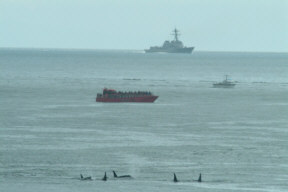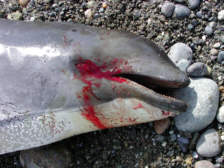
 |
|
| Home | Our Research | Luna / L98 | Active Sonar | Donate & Act Now | About Us | |
| PRESS RELEASE: On 5 May 2003, the US Navy Guided Missile Destroyer Shoup DDG 86 conducted sonar operations for five hours in the Strait of Juan de Fuca and in Haro Strait between Vancouver Island, creating one of the most obvious displays of marine mammal harassment that experienced observers have ever seen, anywhere. |

photo: Ken Balcomb |

photo: Sandy Dubpernel |
The terrorized whales and porpoises in the region could not escape the intense mid-frequency (3 kHz) long duration "pings" from the ship’s SQS 53C sonar; and, several porpoises are reported to have "coincidentally" stranded and died following the sonar event. The carcasses of these mammals have been collected for forensic examination for acoustic pressure trauma (bleeding in ears and brain). |
|
By chance, J pod of 22 killer whales was in Haro Strait at the time of the sonar operations. Observers noted that they abruptly stopped their feeding and gathered in a tight group to swim close to shore at the surface for the duration of the sonar exercise. The sonar "pings" were so powerful (>200 dB re 1 uPa) that they could be heard in air by visitors along the shoreline of San Juan Island.
The US Navy is seeking exemption from the Endangered Species Act and the Marine Mammal Protection Act in Congress this week www.orcanetwork.org/news/news.html#govexec, in part because they know they are the most egregious of marine mammal harassers and killers worldwide. Since March 2000, when they chased 17 whales ashore in the Bahamas, the Navy has known that their sonar kills and injures whales at distances well beyond the visual horizon, yet they continue to "exercise" in inappropriate and confined waters killing these innocent animals. In just this one day that we recently videotaped, the Navy’s lethal sonar adversely impacted every marine mammal within twenty miles of the ship. No wonder marine mammals are stranding and their populations are declining. This is a literal "no-brainer" for the Navy and the whales. For more information, go to orcanetwork.org/. |